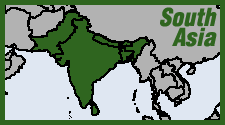 The rural marshlands of Bangladesh have become the latest part of the world to be hit by the unhappy global plague of methamphetamine use. More and more of the country's struggling peasants are taking to "yaba," little pink sugar-coated pills made from caffeine and meth that are flooding in from neighboring Burma. Annual seizures of yaba in Bangladesh increased by a jaw-dropping 80,000% over the past decade, authorities say. A disturbing on-the-scene report from Public Radio International emphasizes that in conservative and Muslim rural Bangladesh, yaba is not used as a "party drug." The speed pills are most often used to get folks through long days of hard labor.
The rural marshlands of Bangladesh have become the latest part of the world to be hit by the unhappy global plague of methamphetamine use. More and more of the country's struggling peasants are taking to "yaba," little pink sugar-coated pills made from caffeine and meth that are flooding in from neighboring Burma. Annual seizures of yaba in Bangladesh increased by a jaw-dropping 80,000% over the past decade, authorities say. A disturbing on-the-scene report from Public Radio International emphasizes that in conservative and Muslim rural Bangladesh, yaba is not used as a "party drug." The speed pills are most often used to get folks through long days of hard labor.
Police confiscate lots of the stuff, and burn it doused with alcohol in big public spectcales—leaving "a viscous, pink slurry of intoxicants, seeping into the soil." But low wages for cops are cited as incentivizing corruption that enables the trade.
Burma is named as Asia's top exporter of methamphetamine —with the trade protected by the country's powerful military. In the highlands of northern Burma, ethnic militias—some directly backed by the government—crank out meth with impunity. As a former US Drug Enforcement Agency chief previously told PRI, Burma's army is "providing tacit approval for drugs to be produced in these areas.."
The cannabis trade is still thriving in the region too—despite aggressive enrocement efforts. India's NDTV reported last week on the seizure of an impressive 100 kilograms of herbaceous cannabis on the Bangladesh border. India's Border Security Force carried out the seizure, although the account did make clear if the cannabis was being smuggled in from Bangladesh or out from India. Both countries produce plenty.
But the more enforcement pressure on herb, the more meth will become attractive. Meth is more compact and harder to detect, so it is more convenient for smugglers. And if cannabis is not available but meth is, the oppressed peasantry is more likely to turn to the latter for some solace, escape or stimulation.
Contrary to stoner folklore, no, the name Bangladesh is probably not related to the word bhang, Hindi for cannabis (bhanga in Sanskrit). Bhang is an Indo-Aryan word, while Bangladesh takes its name from the Dravidian tribe that inhabited the region before the arrival of the Indo-Aryan invaders thousands of years ago: the Bong. (No snickers please, it's just a co-incidence; they were named for their Sun god.)
The word "ganja" does come from the Sanskrit word for hemp (that is to say, the cannabis plant, rather than smokable marijuana), essentially the same in Hindi and Bengali. But the name of the Ganges River, which meets the sea in a great delta that is the heartland of Bangladesh, comes from the Sanskrit word for "swiftly-flowing" —again, probably etymologically unrelated.
Still, the cannabis culture in this part of the planet is deeply rooted in an ancient past. Meth is a Johnny-come-lately. And hopefully, it will be a flash in the pan.
Cross-post to High Times







Recent comments
4 weeks 3 days ago
4 weeks 4 days ago
7 weeks 4 days ago
8 weeks 4 days ago
12 weeks 4 days ago
16 weeks 2 days ago
20 weeks 3 days ago
21 weeks 1 day ago
31 weeks 1 day ago
35 weeks 1 day ago